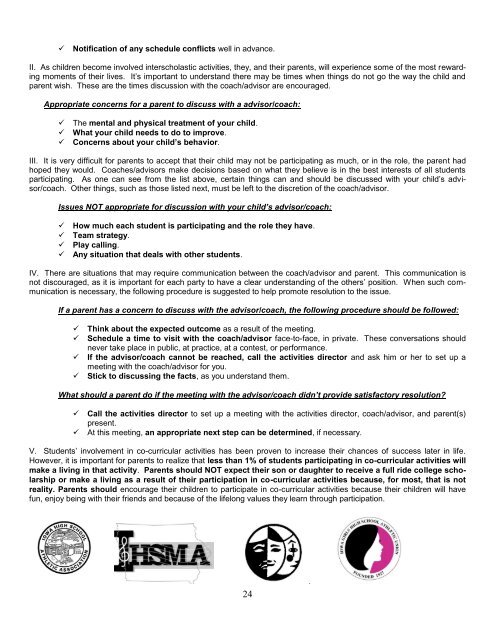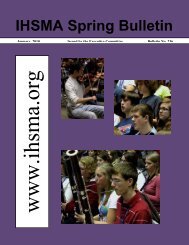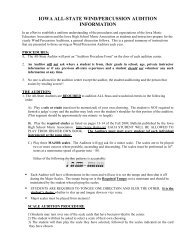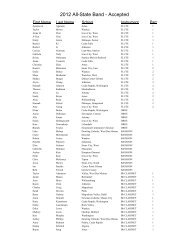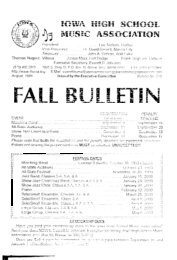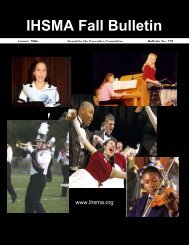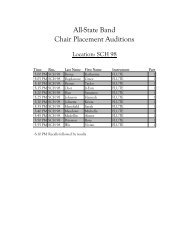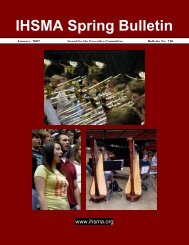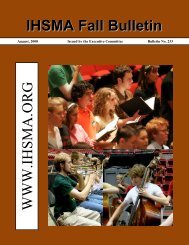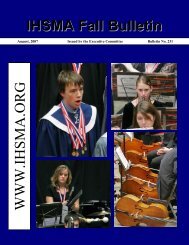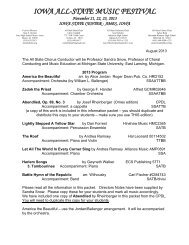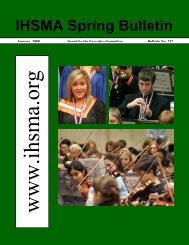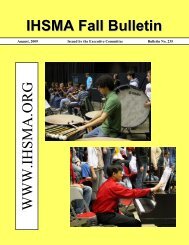Fall Bulletin No. 237 - August 2010 - The Iowa High School Music ...
Fall Bulletin No. 237 - August 2010 - The Iowa High School Music ...
Fall Bulletin No. 237 - August 2010 - The Iowa High School Music ...
Create successful ePaper yourself
Turn your PDF publications into a flip-book with our unique Google optimized e-Paper software.
<strong>No</strong>tification of any schedule conflicts well in advance.<br />
II. As children become involved interscholastic activities, they, and their parents, will experience some of the most rewarding<br />
moments of their lives. It’s important to understand there may be times when things do not go the way the child and<br />
parent wish. <strong>The</strong>se are the times discussion with the coach/advisor are encouraged.<br />
Appropriate concerns for a parent to discuss with a advisor/coach:<br />
<strong>The</strong> mental and physical treatment of your child.<br />
What your child needs to do to improve.<br />
Concerns about your child’s behavior.<br />
III. It is very difficult for parents to accept that their child may not be participating as much, or in the role, the parent had<br />
hoped they would. Coaches/advisors make decisions based on what they believe is in the best interests of all students<br />
participating. As one can see from the list above, certain things can and should be discussed with your child’s advisor/coach.<br />
Other things, such as those listed next, must be left to the discretion of the coach/advisor.<br />
Issues NOT appropriate for discussion with your child’s advisor/coach:<br />
How much each student is participating and the role they have.<br />
Team strategy.<br />
Play calling.<br />
Any situation that deals with other students.<br />
IV. <strong>The</strong>re are situations that may require communication between the coach/advisor and parent. This communication is<br />
not discouraged, as it is important for each party to have a clear understanding of the others’ position. When such communication<br />
is necessary, the following procedure is suggested to help promote resolution to the issue.<br />
If a parent has a concern to discuss with the advisor/coach, the following procedure should be followed:<br />
Think about the expected outcome as a result of the meeting.<br />
Schedule a time to visit with the coach/advisor face-to-face, in private. <strong>The</strong>se conversations should<br />
never take place in public, at practice, at a contest, or performance.<br />
If the advisor/coach cannot be reached, call the activities director and ask him or her to set up a<br />
meeting with the coach/advisor for you.<br />
Stick to discussing the facts, as you understand them.<br />
What should a parent do if the meeting with the advisor/coach didn’t provide satisfactory resolution<br />
Call the activities director to set up a meeting with the activities director, coach/advisor, and parent(s)<br />
present.<br />
At this meeting, an appropriate next step can be determined, if necessary.<br />
V. Students’ involvement in co-curricular activities has been proven to increase their chances of success later in life.<br />
However, it is important for parents to realize that less than 1% of students participating in co-curricular activities will<br />
make a living in that activity. Parents should NOT expect their son or daughter to receive a full ride college scholarship<br />
or make a living as a result of their participation in co-curricular activities because, for most, that is not<br />
reality. Parents should encourage their children to participate in co-curricular activities because their children will have<br />
fun, enjoy being with their friends and because of the lifelong values they learn through participation.<br />
24


